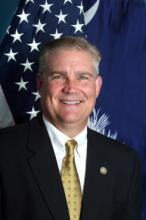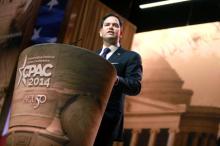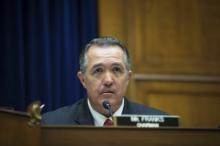GOP

God’s role in our political system was prominently mentioned during the recent Republican debate, even more than the economy. Some presidential wannabes, sounding more like candidates for preacher-in-chief instead of commander-in-chief, believe God supports the Grand Old Party and their campaigns for the White House.
The debate forced me to seek the views of four famous religious leaders who grappled with the relationship between religion and society: Dorothy Day (1897-1980), a Catholic social activist and a candidate for sainthood; Moses Maimonides (1135-1204), a philosopher, rabbi and physician; Reinhold Niebuhr (1892-1971), a Protestant theologian and champion of “Christian Realism;” and Stephen Wise (1874-1949), a prominent, politically active rabbi.

Mormons lean more heavily toward the Republican Party than any other major demographic group — whether clustered by race, age, gender, educational attainment, or religion.
So says a study released April 7 by the Pew Research Center, based on more than 25,000 survey interviews conducted nationwide in 2014.
The survey shows that 70 percent of Mormons lean Republican, compared with just 22 percent who tilt Democratic. That 48-point gap is greater for the GOP than margins provided by any other single group.
Behind Mormons in GOP support are white evangelical Protestants, who give the party a 46-point edge; white Southerners, a 21-point GOP advantage; white men with some college education or less, also 21 points; whites, 9 points; and the “silent generation,” ages 69 to 86, 4 points.
Groups that lean Democratic most heavily are blacks, who give that party a 69-point edge; Asians, a 42-point margin; religiously unaffiliated, 36 points; post-graduate women, 35 points; Jews, 30 percent; Hispanics, 30 points; and the millennial generation, ages 18 to 33, 16 points.
“Obviously, Mormons are one of the strongest groups for Republicans, right on par with white evangelicals. Both groups are about three times as likely to lean towards the Republican Party,” Jocelyn Kiley, associate director of the Pew Research Center, said.
“That’s been the case for a long time.”

A recent survey found that 57 percent of Republicans agreed that Christianity should be established as the United States’ national religion.
Not only would this violate the clear wording of the Constitution and the intention of the founders to keep religion and government separate, it also raises a difficult quandary.
Whose Christianity?
Of the estimated 1,500-plus Christian denominations in the U.S., which flavor of Christianity would emerge as the national standard?
Would it be conservative Christianity or liberal Christianity? Would it be Roman Catholic, Protestant, Orthodox, or nondenominational? Would it be church-centered Christianity or a more personal flavor, such as house communion? Would it be the 1950s-style neighborhood-church Christianity that many older churchgoers yearn for, or a contemporary megachurch?

In November, President Obama issued an executive action that would protect nearly five million undocumented immigrants in the United States. Yet, since Congress returned in January, many questions linger regarding the implementation of executive action and the status of comprehensive immigration reform.
Last week, the Senate Committee on Homeland Security and Governmental Affairs hosted a hearing regarding “Deferred Action on Immigration: Implications and Unanswered Questions.” The purpose of the hearing according to Chairman Sen. Ron Johnson (R-Wis.) was to “obtain a more complete understanding of the logistical, financial, and national security implications of these [executive action] policies.” Yet, many questions still remain.
Among other things, Obama’s November action expanded the 2012 Deferred Action for Childhood Arrivals program and provided legal reprieve to the undocumented parents of U.S. citizens and permanent residents who have resided in the country for at least five years. It protects a small number of the 11 million aspiring Americans who are living and working in the United States without documentation. At it is root, Obama’s executive action considers the people, not the politics that create division.
The GOP majority in Congress is attempting to oppose executive action by threatening to defund the Department of Homeland Security.

The Republican National Committee on Friday launched its first web-based effort to rally conservative believers behind the party, a sign of how crucial voter turnout will be in this fall’s close-fought midterm elections and an indication that the GOP cannot take its evangelical Christian base for granted.
“This shouldn’t be outreach, this should be who we are — it is who we are,” said Chad Connelly, director of faith engagement for the Republican National Committee and the force behind this new initiative, GOPfaith.com.
Evangelicals, Connelly said, “are our biggest, most reliable voting bloc.”
The problem, however, is that even though evangelicals identify more closely than ever with the GOP, they have not been turning out at the polls in sufficient numbers to carry Republican candidates to victory.

How many voters know that former Florida Gov. Jeb Bush is a Roman Catholic? Or that Texas Sen. Ted Cruz is a Southern Baptist, not a Latino Catholic? Or that Florida Sen. Marco Rubio worships at both a Catholic parish and an evangelical church?
More importantly, does it matter?
Actually, it does in today’s Republican Party, where a number of factors have forged a new religious identity that supersedes familiar old categories.
These prominent Republicans are emblematic of the new religious amalgam that, in many instances, has helped refashion denominational differences that were once almost insurmountable. Look no further than the stunning Virginia primary victory of Dave Brat, a Catholic with degrees from a Reformed Protestant college in Michigan and Princeton Theological Seminary, who took down House Majority Leader Eric Cantor last week.

THIS IS OUR first issue of the new year, and with the new year comes new challenges, new hopes, and new promises which, in order of appearance, you may not live up to, will probably fail to realize, and may never keep. Fortunately, this January issue comes out in early December, several weeks before most self-delusions begin to surface, so there’s still time to change them all, thus saving face. And here in Washington, D.C., saving face is very important. Living up to challenges, not so much. But saving face? We understand.
So let’s get started with turning your future failures into successes and your future frowns into smiles, which are just frowns turned upside down, depending on whether you’re standing on your head at the time.
The point is, you don’t have to make the same mistakes again this year, because we can stop your resolutions before you make them. We can nip failure in the bud, because failure is just eruliaf turned upside down. Or possibly backward. Regardless, following is a short list of things you may have pledged to do this year. Think again.
Lose weight. Right. Sure. Whatever. Not going to happen. So stand up straight and hold your stomach in until your friends walk by. Then breathe. And remember: You’re not too fat. You’re just too short.

AS FIGHTS ABOUT the budget and other economic issues are again riveting the nation’s capital, the rest of the country yawns. Possible government shutdowns, threats to default on our nation’s debt, and proposals to decimate food assistance for struggling Americans seem to be business as usual in Washington, D.C. These budget battles have become so frequent that it is tempting to dismiss it all as political posturing. But that would be a mistake.
The biggest challenge facing Congress should be a non-issue. The debt ceiling is simply the amount of debt the U.S. is legally allowed to hold. It is about paying off the bills that Congress has already incurred from past appropriations—not about giving permission for new government spending, as many people falsely assume. Congress has raised it nearly 100 times since the end of World War II, but it only recently became a political football. Because the consequences of not raising the debt ceiling and defaulting on our nation’s obligations could be catastrophic, some leaders have tried to leverage it for political gain. After the country came close enough to a default in 2011 to receive a credit downgrade, President Obama has responsibly refused to negotiate over raising it. His assumption is that GOP leaders in Congress wouldn’t throw the economy off the cliff for their own political gain. The American people are left watching this game of chicken and hoping somebody blinks.
While this is clearly a partisan game, the stakes couldn’t be higher. The U.S. has always honored its debts. Should the country default, the market turmoil and long-term effects could be catastrophic for the global economy. Domestically, it could throw the U.S. back into recession.

The message of Christ is not often so clearly presented in American media as it was yesterday, nor is that message as clearly contradicted in the same news cycle.
Yesterday, Pope Francis, while not actually changing any doctrinal stance of the Catholic church, clearly asserted in a rare and frank interview that compassion and mercy must be the light that radiates from the global church for the world to see, rather than the church’s current “obsession” with gays, birth control, and abortion.
At the same time that the pope’s words were cycling through the media, other words were also coming through loud and clear: those of Republican lawmakers who have decided that the least of these will remain just that and, accordingly, voted to slash the food stamp budget by almost $40 billion.
The juxtaposition presented between these two events is striking. It also represents an enormous divide among Christians, and, frankly, demonstrates why so many feel Christianity is a religion full of hypocrisy.

Yesterday, before Republicans in the House of Representatives voted to push through a plan to slash nearly $40 billion from the food stamp program, Jim Wallis said we would keep an eye on which way of our elected officials voted.
"We will be watching who votes against feeding the hungry this week and will remember to bring that to public attention when they run for re-election. We will be doing our own faith count today. Stay tuned for the results."
Well here are the results. The plan passed narrowly, 217-210 — with all the yea votes coming from the Republican side. Fifteen Republicans joined with the Democrats against the plan.
So, who voted for that $40 billion cut to the food stamps program, which would kick an estimated 4 million hungry people out of the program next year? Here's your list. Is your Congress member on it?

I SPENT MY first year after college doing voluntary service in Portland, Ore., serving as the hunger action coordinator for a small Catholic organization called the Oregon Center for Peace and Justice. That fall, I joined a group of church anti-hunger activists from around the state in a meeting with our Republican U.S. senator, Mark O. Hatfield. We asked him a number of questions, and urged his continuing support for food- and hunger-related legislation.
When it came my turn, I said, “Senator, how do you reconcile the compromises that you inevitably have to make as a politician with the ideals you hold as a Christian?” In his reply, Sen. Hatfield pointed to the difference between compromises of principle—which he said he would never make—and the tactical compromises necessary to make progress in a pluralistic society. Without the latter, the senator said, politics is nothing but an ideological shouting match.
These days, it’s clear that most far-right Republicans, including those in the party’s leadership, take a slightly different approach to inter-party cooperation than did the late Sen. Hatfield. They seem to see it less as building bridges for the sake of governing a varied society and more as sleeping with the enemy.
There’s probably no better recent example than the issue of health care. The Affordable Care Act, aka Obamacare, is the law of the land—passed by Congress, signed by the president, and ruled constitutional by the Supreme Court. But none of those legal niceties seem to matter to the raw-meat GOP. Their attempts to circumvent or undercut the law range from the inane (such as 67 failed tries—count them: 67—to overturn the ACA by congressional vote) to downright bullying.
The GOP was highly criticized by Democratic officials for their plan to offer a path to citizenship for illegal children with the exclusion of legalizing their parents. White House advisors remain spiteful of the GOP’s immigration plans accusing them of “cruel hypocrisy.” The Associated Press reports:
Dan Pfeiffer (FI'-fer) says over Twitter that the plan boils down to allowing some kids to stay while deporting their parents.
Read more here.
President Barack Obama pushed back immigration reform on Tuesday indicating the bill will likely be passed in the fall. Expressing his opinion to Telemundo’s Denver affiliate, Obama supports the notion that all illegal immigrants be granted citizenship following an agreement upon GOP leaders. The Washington Post reports:
The president said that denying undocumented immigrants the chance to become citizens would leave them “permanently resigned to a lower status. That’s not who we are as Americans.”
Read more here.
For the first time in 50 years, the House of Representatives cut mention of food stamps in the Farm Bill, which passed the House yesterday. The Supplemental Nutrion Assistance Program has historically made up nearly 80 percent of funding in such bills. Following the 216-to-208 vote, the House's decision to go through with the ruling has both parties defensive. The Washington Post reports:
"The vote made clear that Republicans intend to make significant reductions in food stamp money and handed Republican leaders a much-needed victory three weeks after conservative lawmakers and rural state Democrats revolted and blocked the original version of the bill that included food stamp money."
Read more here.
In the next few weeks President Barack Obama is expected to visit key states throughout the U.S. Making it his mission to explain the economic values immigrants would have on the U.S. if in fact the bill were to pass, democratic officials believe Obama will use his time to highlight financial gains that would come from the passing of immigration reform.TIME reports:
It is, allies concede, a telling sign that the bill’s fortunes are foundering in the fractious Republican-controlled House — and a symbol of Obama’s vanishing clout just six months into his second term. Democratic officials expect that over the coming weeks Obama will travel across the U.S., likely to strategically important states like Nevada, North Carolina and Texas, to highlight the economic benefits of the law. Obama summoned Democratic Senator Chuck Schumer and Republican Senator John McCain to the White House on Thursday to discuss ways to advance the bill in the House. The West Wing is waiting on House Republicans to choose a path on immigration reform before finalizing its strategy, but aides plan a markedly different role for the President over the coming months.
Read more here.
House Speaker John Boehner promised today that the House will hold a vote over whether to delay a key part of Obamacare. Politico reports:
The GOP’s message is that President Barack Obama is choosing big business over ordinary Americans after the White House postponed a provision that requires employers provide health insurance for their workers.
The Speaker also called the Administration's actions "wrong" and "outrageous." Read more here.

On the eve of the GOP immigration summit, during which Republicans will determine their position and strategy on immigration reform, the Evangelical Immigration Table held a press conference with national leaders to strongly urge House members to find the political courage to move forward on commonsense immigration reform.
“We have forgotten to engage in conversation and instead have focused on throwing stones at arguments,” David Cooper, President and Head of School at Front Range Christian School in Littleton, Colo., said.
Currently, hundreds of Evangelical Christians are expected to join in a day of prayer and action in Washington, DC on July 24, following the 92-day Pray4Reform challenge. During this challenge, people of faith across the country are taking a few minutes each day to lift up their political leaders in prayer as they consider the options moving forward. More than 25,000 prayer partners have signed up for the challenge since its start, and we welcome many more to join.
The month of July stands as an important time for Congress as members of the House and Senate attempt to make decisions about six major U.S. issues. Some vital decisions that need to be agreed upon before next month’s recess involve: immigration reform, student loan debates, budget planning, and fiscal issues. The Washington Post reports:
Significant debates await the House and Senate in the coming weeks over a new budget, a new farm bill, federally-subsidized student loans, several key Obama administration nominees and an overhaul of the nation’s immigration laws, which remains the year’s biggest political fight.
Read more here.
In order to gain substantial backing in the 2014 midterm election, Republicans are beginning to flaunt major environmental and economic issues regarding President Barack Obama’s climate change policies.The New York Times reports:
Elected officials and political analysts said the president’s crackdown on coal, the leading source of industrial greenhouse gases, could have consequences for Senate seats being vacated by retiring Democrats in West Virginia and South Dakota, for shaky Democratic incumbents like Mary L. Landrieu of energy-rich Louisiana, and for the Democratic challenger of Senator Mitch McConnell of Kentucky, the Republican leader.
Read more here.

As the House debates a bill to limit abortion, Republicans are reopening a subject that cost them dearly in 2012 and continues to present perils for the party’s attempt to appeal to women voters.
Even before the full House took up the bill Tuesday to ban abortion after 20 weeks of pregnancy, Republicans had a sharp reminder of how sensitive the issue can be when Rep. Trent Franks, R-Ariz., appeared to say that rape rarely results in pregnancy.
“The incidence of rape resulting in pregnancy [is] very low,” Franks said at a June 12 committee hearing on the bill. Franks later said he meant that third-trimester abortions of pregnancies caused by rape are rare.